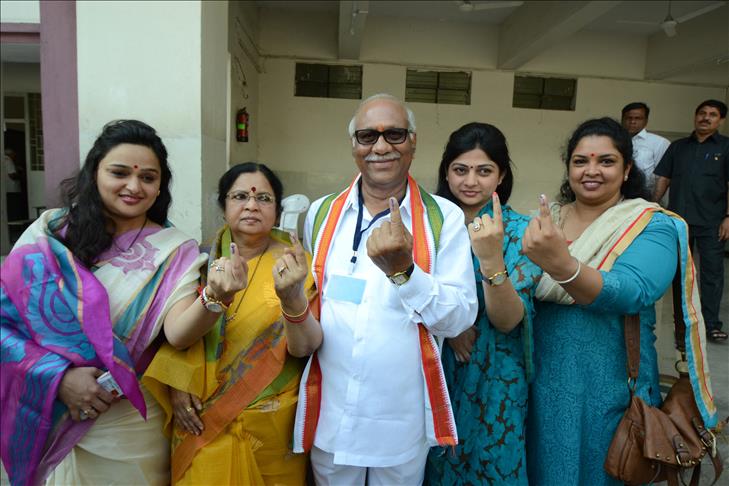
by Nilanjan Dutta
KOLKATA, India
India's parliamentary election has been characterised by the battle between Hindu nationalist Bharatiya Janata Party's (BJP) attempts to unseat the ruling Congress party, attracting attention on both national and international scales. In the eastern state of West Bengal however, the so-called "BJP wave" is no more than a strong undercurrent. There, the two main parties are the ruling Trinamool Congress and the Left Front, led by the Communist Party of India, who are both more interested with winning over the votes of the Muslim minority community.
Only three years ago, the Trinamool Congress ended the Left Front’s 34-year old run in government with a clear victory. The Trinamool, literally meaning "grassroots," is a breakaway-faction from Congress led by Mamata Banerjee, the state’s present chief minister. She comes from a high-caste Hindu but ordinary middle-class background and became popular for her plain living, street-fighter image.
Though elections to the state Assembly are still two years away, both parties have their eyes set on them. So none can afford to displease the minority community which constitutes more than a quarter of the state’s population. Their importance of gaining the Muslim vote became evident as soon as the both parties' candidates’ were announced.
The Trinamool Congress slated seven Muslims while the Left Front has fielded an unprecedented 12 out of their 42 runners, a proportion more than the 25 percent of the population that Muslims constitute, according to the last census. In the 2011 Assembly elections in which the party had defeated the Left Front, there were only 39 candidates from this segment in a total of 228, or 13.26 in terms of percentage.
Unlike many other parts of the country the politics of religious identity has never been considered much important in West Bengal, ideology instead has been a guiding factor. Although all the major parties have had their share of "minority leaders," they were not given the numerical importance that they should deserve in terms of the population figures.
That, however, did not prevent the Trinamool Congress from gaining mass support from Muslims who became distanced from their traditional allies, the Left. The Left Front government’s "development" initiative during the last decade is considered to be a major factor behind this shift. Land was being forcibly acquired in villages where many of the poor Muslims lived and worked as small and marginal peasants, tailors, petty traders and labourers for building industries, townships, etc. They turned against the Left regime and strongly resisted the government drives along with the people of the majority community who were also facing displacement.
However, a feeling that has been growing among the minorities is that the Trinamool Congress government has not been able to bring about any perceptible change in their socio-economic and educational condition, preferring to "woo" them with favors. One of the much-touted "gifts" to Muslims was a monthly allowance for the Imams of mosques from the state exchequer. Not only people of the majority community, but also many of the Muslims were not too pleased with it -- who questioned why Imam’s needed the money instead of it being used for education services.
Nazrul Islam, a senior officer of the Indian Police Service whom neither the Left Front government nor its successor has found easy to handle, took up the cudgel on this issue. Shortly after his retirement on 28 February he held a press conference announcing that he would devote the rest of his life to fight for the rights of the minorities in the state. He has written a number of books recently on the condition of the minorities in West Bengal and criticized Banerjee for "neglecting" their interests. In one of his books, 'Musalmander Karaniya' (Tasks before the Muslims), he accused the chief minister of assuming that Muslims are "uneducated, unaware and unorganized" and trying to buy them off. The government sought to ban the book but had to back out later amid strong criticism.
The minority issue had been brewing up even within the Communist Party. The maverick peasant leader Abdur Rezzak Mollah, who was the land and land reform minister in the Left Front government, has been expressing his mistrust of the party’s "elite" leadership for quite some time. Now, close to the parliamentary polls, he has floated a new outfit called the
'Social Justice Forum,' whose inaugural meeting in Kolkata was attended by a number of Muslim and Dalit (lower-caste Hindu) leaders from across the state.
Mollah announced that it would not enter the poll fray before the 2016 Assembly elections but would campaign and work in such a way that the importance of the minorities and Dalits in the politics of West Bengal could be felt by all concerned. The ultimate objective of the new forum, he said, was to see "a Dalit chief minister and a Muslim deputy chief minister" in West Bengal. Together, the Dalits and Muslims account for 47 per cent of the state’s population.
The major political parties seem to have taken note of the mood of the minority community and reflected their concern in their candidate lists. By including more minority candidates than ever, they might be able to tide over the trouble for now. But that is not likely to see the end of identity politics.
englishnews@aa.com.tr
Anadolu Agency website contains only a portion of the news stories offered to subscribers in the AA News Broadcasting System (HAS), and in summarized form. Please contact us for subscription options.

